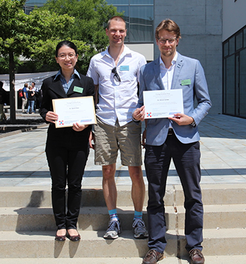Award for innovative solutions in energy technology

Mainz / Fribourg (Switzerland). Dr. Qianli Chen, postdoctoral researcher at the Max Planck Institute for Polymer Research (MPI-P), has been awarded the Young Scientist Prize of the Swiss Neutron Scattering Society (SGN). Chen received the award for her outstanding doctoral thesis on the occasion of the annual meeting of the Swiss Physical Society on July 1, 2014 in Fribourg (Switzerland).
Qianli Chen completed her doctoral thesis at Empa – Swiss Federal Laboratories for Materials Science and Technology - and ETH Zurich, before she came to MPI-P in 2013. For her doctoral thesis she investigated the materials based on ceramics in fuel cells. "The subject interested me from the beginning because the production of electricity by fuel cells is cleaner and more efficient than using conventional methods," Chen describes her academic motivation. Ceramic fuel cells are robust and flexible regarding the choice of fuels, as hydrogen and also natural gas can be used. However, they require operation temperatures as high as 600-1000 degrees, requiring long start-up time, and leading to durability issues and the need for expensive component materials. With the development of ceramic proton conductors as fuel cell electrolytes the operation temperature is reduced to 400-500 degrees. Qianli Chen has analyzed the mechanisms of proton conductivity with neutron scattering techniques, specifically the impact of strain on the proton conductivity, and discovered an effect that can be exploited in fuel cells promising improvement in efficiency. Her finding opens up an entirely new approach to the development of more efficient fuel cells and other electrochemical devices.
Qianli Chen is devoted to a similarly complex energy-related problem at MPI-P. Sensitized solar cells have large economic and environmental advantages over their counterparts made of silicon. However, their efficiency is too low, and the molecular interactions between their components need to be fully understood in order to improve their performance. The research of Chen aims at understanding the chemical processes between the solar cell components using Raman spectroscopy, which she develops in the research group of Dr. Katrin Domke.












